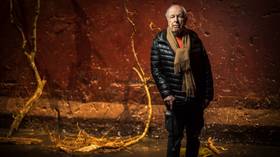Theater legend Peter Brook dies


British theater director Peter Brook died in Paris on Saturday, aged 97. Brook’s groundbreaking reinterpretation of Shakespeare’s classics, and his willingness to stage performances in the most unusual settings, earned him adoration, acclaim and awards.
Brook’s death was reported by multiple media sources, with the director’s son, Simon, confirming his passing on Sunday. Born in Britain to Lithuanian Jewish parents, Brook had resided in Paris since the mid 1970s, and is survived by his two children, Simon and Irina. His wife, actress Natasha Parry, died in 2015.
Brook's cousin, Valentin Pluchek, went on become a famous director and actor in the Soviet Union, winning multiple state prizes and leading the Moscow Theater of Satire from 1957, through the fall of the USSR until 2000.
After directing Christopher Marlowe’s ‘Doctor Faustus’ in 1943 and Jean Cocteau’s ‘The Infernal Machine’ two years later, Brook took the helm at the Royal Shakespeare Company in Stratford-Upon-Avon in 1947, where he directed some of the greatest actors of the 1950s, including John Gielgud, Paul Scofield and Laurence Olivier.
Determined to wrest control of Shakespeare’s work back from “a small number of very conventional people” who staged his plays “in the most boring way imaginable,” Brook is renowned for his 1970 production of ‘A Midsummer Night’s Dream,’ in which he put the cast on stilts and trapezes on a set of white frames and steel wire, in a bid to create an airy, dreamlike atmosphere.
Working with the Royal Opera House in the late 1940s, Brook confounded critics with his staging of the Richard Strauss opera ‘Salome,’ featuring a set designed by Salvador Dali. He continued to court controversy in Paris during the 1960s, staging a production of Jean Genet’s ‘The Balcony’ that featured amateurs found in the city’s bars playing the occupants of a brothel.
From the elaborate set of ‘Salome,’ Brook stripped everything away for his 1962 production of ‘King Lear,’ which featured a bare stage and plain lighting. In 1985 he put on a nine-hour interpretation of ‘The Mahabaharata,’ an epic Indian poem, in a bare quarry in France.
“I can take any empty space and call it a bare stage. A man walks across this empty space, whilst someone else is watching him, and this is all that is needed for an act of theater to be engaged,” he wrote in 1968.
After moving to Paris, Brook set up the International Centre for Theatre Research, which gave performances in a minimally-refurbished music hall in the city, and throughout the Middle East and Africa.
As news of his death spread, Brook’s fellow directors and producers paid their tributes. "Peter Brook was the singular theater practitioner of the last century, both fearless and peerless in his enquiry into the breadth and depth of the form,” said National Theater Chief Executive Rufus Norris. “It is with great sorrow that we mourn his passing, and celebrate his extraordinary life in art."